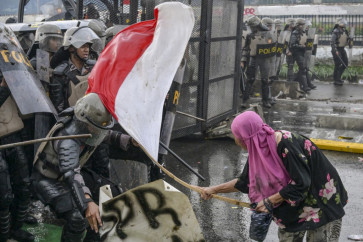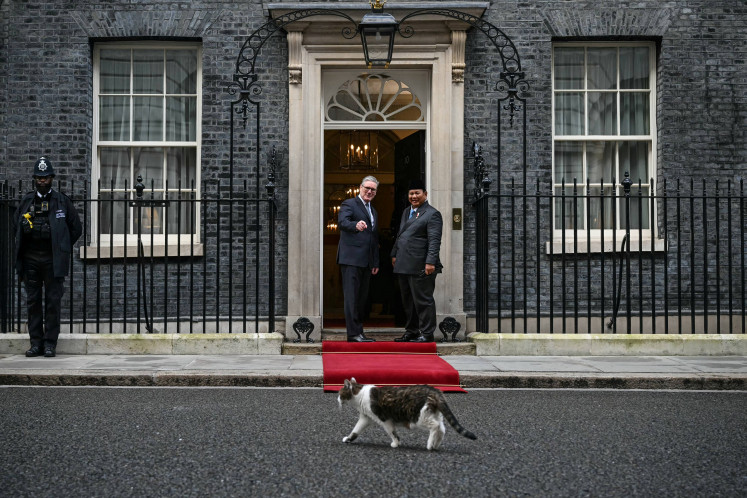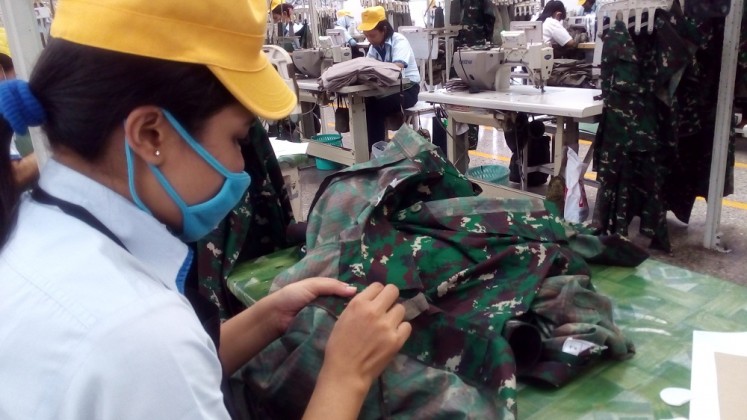Popular Reads
Top Results
Can't find what you're looking for?
View all search resultsPopular Reads
Top Results
Can't find what you're looking for?
View all search resultsA breath of fresh air to the film scene
The Bandung Film Festival dares to be different, picking Hanung Bramantyo’s historical movie Sang Pencerah (The Enlightener), a movie about Muhammadiyah founder Ahmad Dahlan, as the best film
Change text size
Gift Premium Articles
to Anyone
T
he Bandung Film Festival dares to be different, picking Hanung Bramantyo’s historical movie
Sang Pencerah (The Enlightener), a movie about Muhammadiyah founder Ahmad Dahlan, as the best film.
The historical film, produced with a mega-budget of Rp 12 billion (US$1.4 million) for reconstructing 19th century
Yogyakarta – touching up old buildings and creating traditional Javanese costumes, was the topic of controversy, as it was shockingly excluded from the nominees at the 2010 Indonesian Film Festival (FFI).
The 24th Bandung Film Festival, held on May 6 at Bandung’s Horizon Hotel, honored the film, which was passed over in the FFI nominations reportedly for only presenting important events as experienced by Ahmad Dahlan but not other visions or interpretations.
Bandung Film Festival chairman Eddy D Iskandar said that ever since it was first held 1987, the festival tried to emphasize films being screened in Bandung’s theaters.
“The film [The Enlightener] was selected based on its size and its Indonesian taste. We saw that the film had to make an extraordinary setting, and we think it’s worth watching,” said Eddy, who is also chief editor of Galura, a weekly tabloid.
The festival selected the film in the last phase of the selection process, after other elements — editing, music, actors etc. — were selected, he added.
Festival organizers could not have cared less if the film was excluded by the FFI. As long as a film was screened in theaters, the observers would evaluate it.
Such an independent spirit has become the soul and spirit of the annual Bandung Film Festival.
Eddy credited Chand Parwez Servia, a film producer who used to be film distributor and theater businessman in the West Java town of Tasikmalaya, for launching the festival.
In 1985, Parwez asked Eddy to gather film aficionados and film lovers to watch films at his house, which later turned into the festival’s headquarters.
It became a routine every Friday. The participants came from different backgrounds: from cultural observers, journalists, businessmen and painters to people in the film industry.
“We all share one thing in common: we love watching movies. If someone missed it, they got a sort of identification card to allow them to get into any theater in Bandung to watch films,” Eddy said.
They decided to make their reviews public — in writing or in monthly bulletins which they started in 1987. “But [the bulletin] happened only three or four times, since we’re required to have a publishing license,” he said.
Since they could not publish their film reviews, they held a press conference in a restaurant to voice their film choices there and, most importantly, to ensure that people knew what films were worth watching. “The most important thing is that our opinions reached the people,” he said.
And the spirit is maintained today — no registration system is applied to get into the Bandung Film Festival as what is applied by the FFI, which is backed by government funding.
“As long as a film is being screened in theaters, we will evaluate it.”
The Bandung festival also handed out the “praised” title, not the “best” for film and its supporting elements.
Chand Parwez Servia, who acts as chairman for the festival’s advisory council, said the “praised” title meant the film deserved credit or praise — meaning the selected film and its supporting elements could be more than one.
The move, he said, aims to help improve people’s understanding and knowledge of films.
The festival never pushed itself to hand over the top honor, as shown from 1992-2000 when none of the Indonesian films won the “praised” title.
“During that time, the FFI was also in a slump, when film production was at its lowest point. But the [Bandung] film festival was still running to give recognition to those who had made contributions to the Indonesian film industry,” Eddy said.
The Bandung festival’s presence was also appreciated by those in the film industry.
Filmmaker Hanung Bramantyo found the festival to be fair since it was based on observation. “There’s no intervention from the government or anyone else. It’s fair, purely from people’s judgment,” he said.
He also praised the festival’s unique character, since it was supported by those who were committed to Indonesian films.
Similar praise for the festival’s consistency also came from veteran actor Deddy Mizwar, who believes the festival could reach and involve more people.
“The festival should take examples from film festivals overseas, where they are much-anticipated by people. Now, the festival is hardly noticed, even in Bandung,” he said.
Eddy said it was possible to hold the festival for 24 straight years because of so many individual contributions from producers and people in the film industry.
“We once had an offer of up to Rp 500 million from a cigarette company, but we refused it since the company asked us to include the cigarette’s logo in the trophies,” he said.
Funding is not the main consideration in running the festival, as the organizer raised money from ads in a magazine it published. “We raise enough from ads in the magazine. If the money is not enough, then we look for more,” Eddy said.
Parwez said that the festival could be held for 24 straight years with no intervention due to support from people in the film industry.
“When we ask for help, they don’t hesitate, like becoming emcees. We ask emerging actors to help read out nominations. They all are involved based on good relationships. Producers also play big
roles by allowing their stars to come here,” he said.
Eddy said that he once offered a private television station to air the festival, but the organizer was required to pay and was also told to look for ads.
“We could not do it that way. Besides, our spirit is to let people know which film is worth watching. If there’s no money, we have to adjust to the situation. If the situation needs it, we may as well have it back at the restaurant as it was before,” he said.










